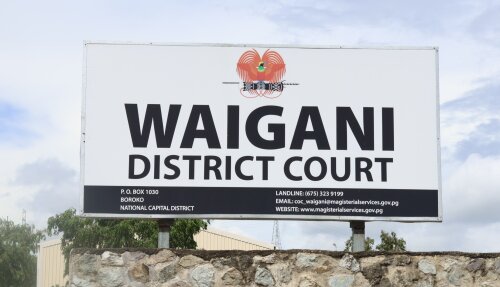Best Military Divorce Lawyers in Port Moresby
Share your needs with us, get contacted by law firms.
Free. Takes 2 min.
Free Guide to Hiring a Family Lawyer
List of the best lawyers in Port Moresby, Papua New Guinea
About Military Divorce Law in Port Moresby, Papua New Guinea:
Military divorce in Port Moresby, Papua New Guinea, involves specific laws and regulations that differ from civilian divorce proceedings. It is essential to understand these nuances when navigating a military divorce to ensure your rights and interests are protected.
Why You May Need a Lawyer:
Seeking legal help in military divorce situations is crucial to ensure you have someone knowledgeable about the laws and processes guiding the dissolution of marriage within the military context. A lawyer can provide guidance on your rights, assist in negotiations, and represent your interests in court if needed.
Local Laws Overview:
In Port Moresby, Papua New Guinea, military divorce is governed by specific laws that consider the unique circumstances of service members and their families. Some key aspects of local laws related to military divorce include division of military pensions, spousal support, child custody arrangements for military parents, and jurisdictional issues when one spouse is stationed overseas.
Frequently Asked Questions:
Q: Can I file for divorce while my spouse is deployed?
A: Yes, you can initiate divorce proceedings while your spouse is deployed. However, special considerations may apply, such as serving divorce papers through military channels.
Q: How is military pension divided in a divorce?
A: Military pensions are considered marital property and may be divided between spouses based on various factors, including the length of the marriage and the time served in the military.
Q: Can I receive spousal support after a military divorce?
A: Spousal support, also known as alimony, may be awarded in military divorces based on factors such as the financial needs of the receiving spouse and the ability of the paying spouse to provide support.
Q: How are child custody arrangements decided for military parents?
A: Child custody determinations in military divorces prioritize the best interests of the child. Factors such as stable living arrangements, parental involvement in the child's life, and the ability to provide for the child's needs are considered.
Q: What are the residency requirements for filing a military divorce in Port Moresby?
A: To file for divorce in Port Moresby, you or your spouse must meet residency requirements outlined in the local laws, which may vary based on your military status and circumstances.
Q: Can my spouse access my military benefits after divorce?
A: Depending on the specific circumstances of your divorce, your spouse may be entitled to certain military benefits, such as healthcare or commissary privileges, especially if you were married for a certain period of time during your military service.
Q: How can I enforce a military divorce decree if my spouse is not complying?
A: If your spouse is not complying with the terms of the divorce decree, you may need to seek legal assistance to enforce the court's orders through appropriate legal channels.
Q: What role does the military play in a military divorce?
A: The military may be involved in aspects of a military divorce, such as enforcing support orders, ensuring compliance with court orders, or providing logistical support for service members navigating divorce proceedings.
Q: Can I represent myself in a military divorce case?
A: While you have the right to represent yourself in a military divorce case, it is advisable to seek legal counsel to ensure your rights are protected and to navigate the complexities of military divorce law effectively.
Q: How long does a military divorce typically take?
A: The timeline for a military divorce can vary based on factors such as the complexity of the case, the willingness of both parties to negotiate, and any contested issues that may arise during the divorce proceedings.
Additional Resources:
For additional information and resources related to military divorce in Port Moresby, Papua New Guinea, you may consider reaching out to legal aid organizations, family law practitioners with experience in military divorces, or government agencies that specialize in family law matters.
Next Steps:
If you are considering or going through a military divorce in Port Moresby, Papua New Guinea, it is recommended to consult with a qualified legal professional who can provide you with personalized advice and guidance tailored to your specific circumstances. Taking proactive steps to understand your rights and obligations in a military divorce can help you navigate the process more effectively and protect your interests moving forward.
Lawzana helps you find the best lawyers and law firms in Port Moresby through a curated and pre-screened list of qualified legal professionals. Our platform offers rankings and detailed profiles of attorneys and law firms, allowing you to compare based on practice areas, including Military Divorce, experience, and client feedback.
Each profile includes a description of the firm's areas of practice, client reviews, team members and partners, year of establishment, spoken languages, office locations, contact information, social media presence, and any published articles or resources. Most firms on our platform speak English and are experienced in both local and international legal matters.
Get a quote from top-rated law firms in Port Moresby, Papua New Guinea — quickly, securely, and without unnecessary hassle.
Disclaimer:
The information provided on this page is for general informational purposes only and does not constitute legal advice. While we strive to ensure the accuracy and relevance of the content, legal information may change over time, and interpretations of the law can vary. You should always consult with a qualified legal professional for advice specific to your situation.
We disclaim all liability for actions taken or not taken based on the content of this page. If you believe any information is incorrect or outdated, please contact us, and we will review and update it where appropriate.








